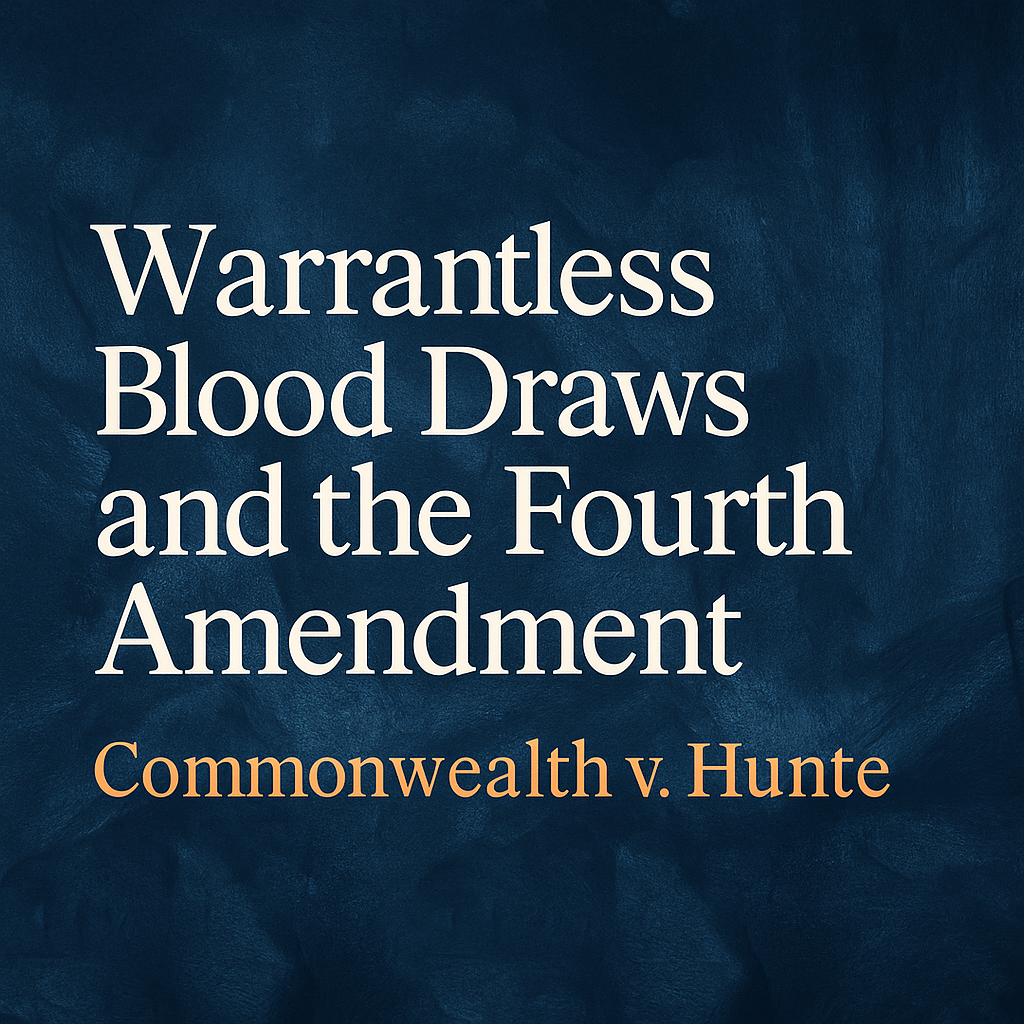Warrantless Blood Draw Statute Struck Down in Commonwealth v. Hunte
June 18, 2025
 Commonwealth v. Larry Wardell Hunte, No. 16 MAP 2023
Commonwealth v. Larry Wardell Hunte, No. 16 MAP 2023
In a major constitutional decision, the Pennsylvania Supreme Court affirmed a Cumberland County trial court’s ruling that 75 Pa.C.S. § 3755, a statutory provision authorizing warrantless blood draws from certain DUI suspects, is facially unconstitutional. The case, , represents a decisive reaffirmation of Fourth Amendment protections and Article I, Section 8 of the Pennsylvania Constitution.
Background
Section 3755 of the Pennsylvania Vehicle Code permits emergency room personnel to draw blood from any motorist involved in a motor vehicle accident requiring medical treatment—without a warrant—if there is probable cause to believe the person was driving under the influence of alcohol or drugs. The results must be transmitted to the Department of Health or a licensed laboratory within 24 hours. The law also provides immunity from civil or criminal liability for hospital staff who perform the blood draw.
Following an accident, Larry Wardell Hunte was subjected to a warrantless blood draw under this statute. He challenged the constitutionality of Section 3755, and the trial court ruled in his favor, declaring the statute facially unconstitutional. The Commonwealth appealed directly to the Pennsylvania Supreme Court.
The Court’s Analysis
Writing for the Court, Justice Wecht focused squarely on the warrantless nature of the search permitted by Section 3755 and whether it comports with constitutional protections.
1. Fourth Amendment and Article I, Section 8
Both the U.S. and Pennsylvania Constitutions protect against unreasonable searches and seizures. The Court reiterated that a blood draw constitutes a search under the Fourth Amendment, citing Birchfield v. North Dakota, 579 U.S. 438 (2016), and requires either a warrant or a valid exception to the warrant requirement.
2. No Applicable Exception
The Commonwealth argued that exigent circumstances or implied consent justified the search, but the Court rejected these justifications:
Exigent circumstances are fact-specific and cannot be presumed categorically by statute.
Implied consent, once a common rationale in DUI cases, has been sharply limited by modern jurisprudence, notably Missouri v. McNeely, 569 U.S. 141 (2013), which holds that natural dissipation of alcohol is not a per se exigency.
Justice Wecht emphasized that allowing warrantless blood draws based solely on probable cause and emergency medical treatment bypasses the individualized analysis required under the Constitution.
3. Facial Invalidity
Unlike an as-applied challenge, which would only affect Mr. Hunte’s case, the Court found Section 3755 facially unconstitutional. This means the statute is invalid in all its applications. Because it authorizes searches without case-by-case judicial evaluation or opportunity to obtain a warrant—even when feasible—it cannot be reconciled with constitutional principles.
Implications of the Decision
The ruling effectively nullifies Section 3755 statewide, ending the practice of automatic warrantless blood draws in emergency room DUI cases. Moving forward:
Law enforcement must seek judicial approval before obtaining blood evidence, unless a recognized exception is factually present.
Hospitals can no longer rely on the blanket immunity provided by the now-invalid statute.
The decision sets a strong precedent limiting legislative shortcuts around Fourth Amendment procedures in the name of public safety.
The Supreme Court's decision in Commonwealth v. Hunte strengthens constitutional protections for individuals involved in car accidents and ensures that warrantless searches cannot be justified by legislative fiat. The ruling underscores a core principle of American law: even those suspected of serious offenses are entitled to privacy and due process.

